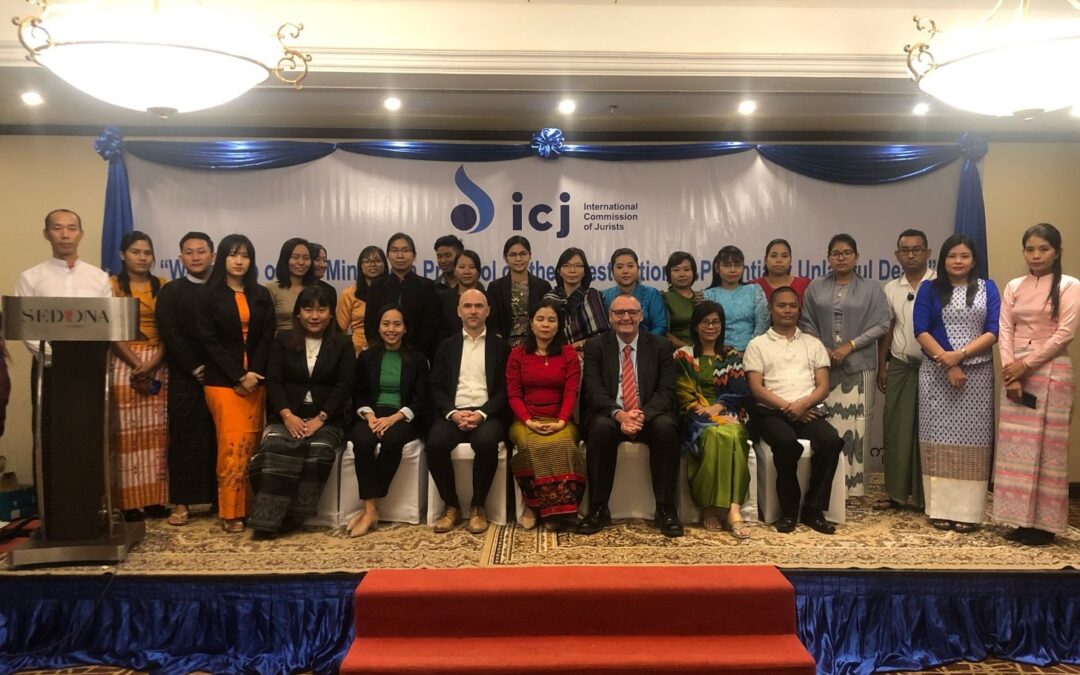
Mar 2, 2020 | News
The ICJ hosted a two-day workshop on 29 February and 1 March 2020 in Yangon, Myanmar entitled “Workshop on the Minnesota Protocol on the Investigation of Potentially Unlawful Death.”
Some 25 lawyers attended the event, including criminal lawyers handling murder cases and human rights lawyers. The workshop was opened with remarks by Frederick Rawski, Director of the ICJ’s Asia & Pacific Programme. He emphasized the importance of conducting investigations consistent with international standards in holding perpetrators accountable for unlawful killings.
The Minnesota Protocol provides guidance on the State’s implementation of its duty under international law to investigate potentially unlawful killings, including when State actors may have been involved. It applies to deaths under custody, suspicious deaths and enforced disappearances. Myanmar has experienced widespread incidents of such deaths, including in recent years those constituting serious crimes under international law.
An overview of the international human rights law framework was provided by ICJ Associate Legal Adviser Jenny Domino, highlighting how the conduct of prompt, effective and impartial investigations into unlawful killings is a core component of the State’s obligation to uphold the right to life. Drawing from her previous work in the Philippines, she also discussed the applicability of Minnesota Protocol standards to the human rights investigations of the killings arising from the Philippine ‘war on drugs’. ICJ Legal Adviser Hnin Win Aung then introduced the Minnesota Protocol and its 2016 revision before discussing the role of lawyers in ensuring that the State conducts investigations in accordance with international standards.
Glenn Williams, an experienced international criminal investigator and Detective Inspector (Retired) of the New Zealand Police Force, discussed how to properly secure a crime scene and chain of custody in order to preserve the integrity of the evidence. Participants applied these skills in a group exercise based on a real-life case scenario. He also presented on the proper conduct of witness interviews and the investigative challenges of dealing with telecommunications evidence.
Dr Porntip Rojanasunan, a forensic pathologist in Thailand and Member of the Expert Advisory Panel during the Minnesota Protocol revision process, shared her forensic expertise through illustrative cases that she had worked on in Southeast Asia in the past two decades. Dr Porntip stressed the importance of forensic pathology in determining the true cause of death and of conducting an autopsy in potential cases of human rights violations.
The workshop is part of the ICJ’s ongoing promotion of international human rights law and standards globally. In Asia, this has included engagement with Myanmar authorities as well as authorities in neighboring countries on the Minnesota Protocol.
See also
Myanmar: ICJ co-hosts Minnesota Protocol workshop with government authorities
Myanmar: ICJ discusses the Minnesota Protocol with prosecutors
Statement: Five years without justice for journalist Ko Par Gyi
Related material
Minnesota Protocol (English)
Minnesota Protocol (unofficial Burmese translation)
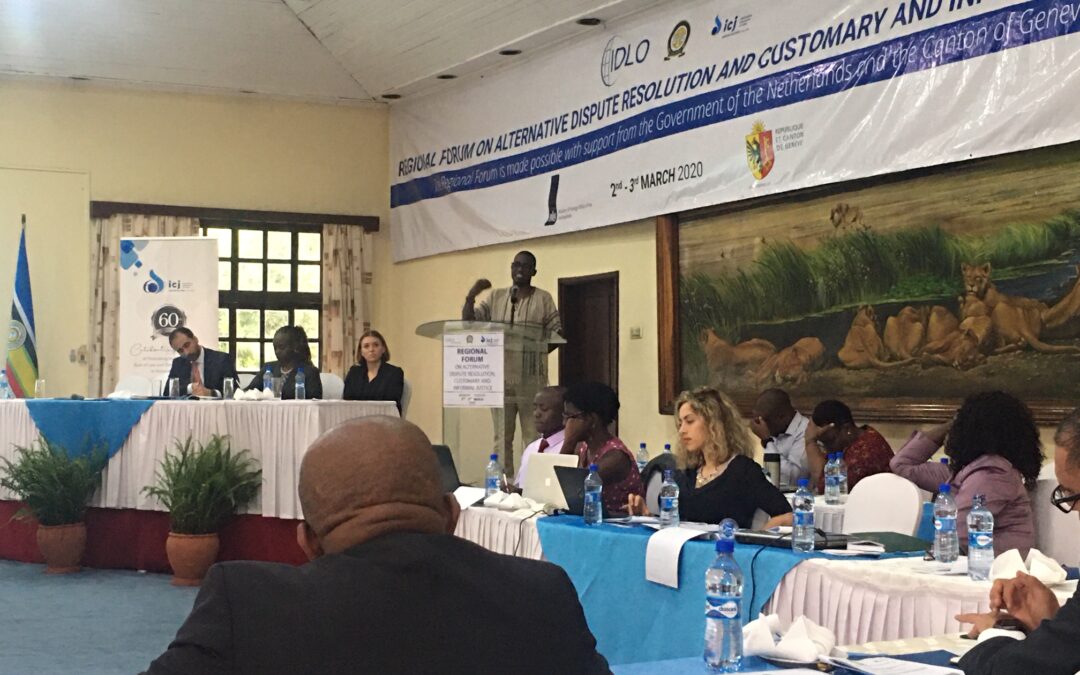
Mar 1, 2020 | Events, News
For the 10th annual Geneva Forum of Judges and Lawyers, the ICJ has partnered with the International Development Law Organization and the ICJ Kenya Section, to organise in Nairobi a high-level regional Forum on alternative dispute resolution and indigenous and other traditional or customary justice systems in Africa.
Under the auspices of the Judiciary of Kenya, the “Regional Forum on Alternative Dispute Resolution & Customary and Informal Justice: Advancing SDG16 and Pathways to Justice” will provide a platform to allow for a deeper reflection on access to justice through alternative and indigenous or other traditional or customary justice systems, providing greater insight into local realities, concerns and approaches and exploring existing lessons, illustrations, and good practices.
The Forum will also facilitate the identification of culturally appropriate, people-centered, sustainable and effective paths for policy and programming that reduce existing justice gaps as well as address challenges in diverse contexts.
Invited justice champions from national governments, the formal and informal justice sectors, and civil society will share insights on ongoing justice sector reforms and policy development that aim to provide alternatives to or complement formal courts, curb rights-abrogating practices, and contribute to inclusive and peaceful societies.
A concept note is available in PDF format here: NairobiConferenceConceptNote
The programme is available in PDF format here: NairobiConferenceAgenda
The final report of the Forum is available in PDF format here.
The Forum is made possible with support from the Government of the Netherlands and the Republic and Canton of Geneva.
For further background on the ICJ Geneva Forum of Judges and Lawyers, and its ongoing global project on indigenous and other traditional or customary justice systems, click here.
A compilation of international sources is available here.
For more information contact matt.pollard(a)icj.org

Feb 28, 2020 | News
The ICJ today welcomed the judgement of the Canadian Supreme Court in the Case of Araya v, Nevsun, which allows a civil lawsuit by a group of Eritrean plaintiffs to proceed against Canadian company Nevsun Resources Ltd. for its alleged involvement in forced labour, slavery, torture and other serious human rights abuses against plaintiffs.
The ICJ together with Amnesty International-Canada intervened in the case as a third party, arguing that Canada’s common law should be read in a manner consistent with the right to an effective remedy for human rights violations under international law and the Canadian Charter of Rights and Freedoms.
“This judgment is a landmark achievement for workers and other victims of human rights violations as well for international rule of law and justice,” said Carlos Lopez, Senior Legal adviser at the ICJ.
“The Supreme Court of Canada has shown that misapplied legal doctrine should not stand in the way of people’s right to effective remedy and reparations,” he added.
In the case, the Supreme Court of Canada rejected the company’s contention that the “act of state doctrine” would preclude the case from going forward.
The Court concluded that this doctrine is not in fact part of Canadian law.
The company also contended that the allegations of breach of customary international law could only be applicable to States and not to the company itself.
The Court, however, held that customary international law, including customary human rights law, is part of Canadian law and could apply to Nevsun as a corporate entity.
In a significant victory for the plaintiffs and other similarly situated alleged victims, the Supreme Court has allowed the case to proceed, dismissing jurisdictional and procedural objections from Nevsun.
The proceedings before the Supreme Court originated in an appeal by the defendant company Nevsun Resources Ltd against the British Columbia Court of Appeal’s judgment of 2017 which upheld the rights of claimants to sue in Canada.
The claim filed in 2015 argued that Nevsun Resources was involved in various ways in the practice of forced labour, slavery, torture, cruel, inhuman or degrading treatment, and crimes against humanity at the Bisha mine (picture) against hundreds of Eritreans who were conscripted into the Eritrean National Service Programme and forced to working in the mine operated jointly by Nevsun and Eritrean State companies.
The claimants were allegedly forced to work in the Bisha mine and fled the country to find refuge in Canada, where they sued Nevsun.
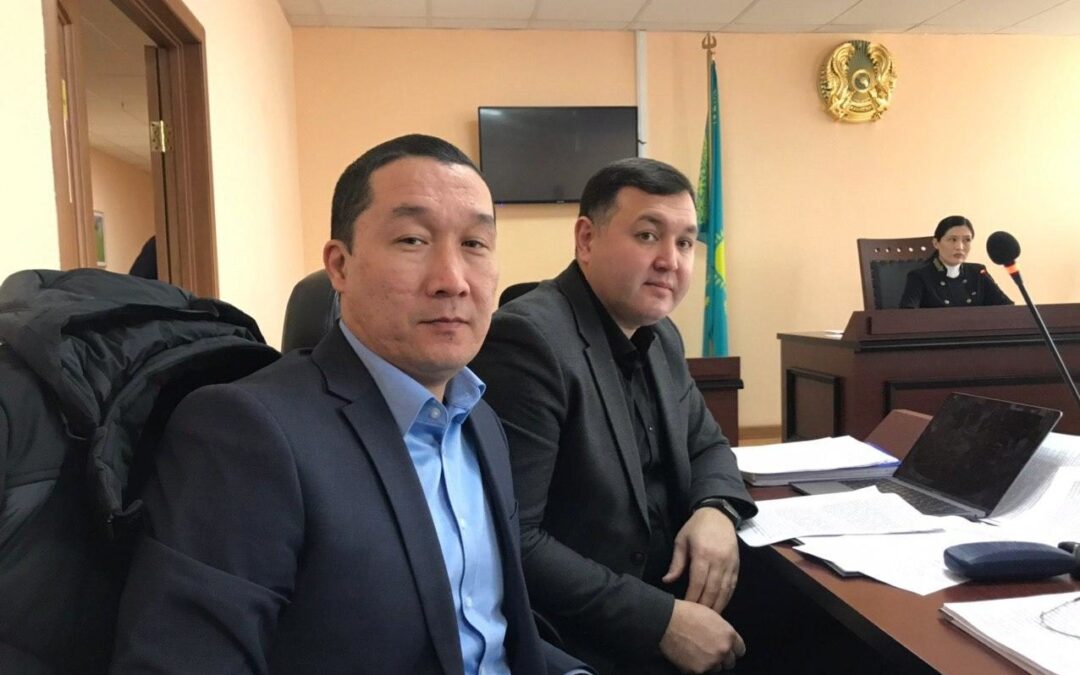
Feb 28, 2020 | News
The ICJ expresses concern at the decisions of 26 February of Yesil and Saryarka district courts of Nur-Sultan to disbar two lawyers, Erlan Gazymzhanov and Amanzhol Mukhamediarov, at the request of the Ministry of Justice.
These disbarments are a blow against the ability of lawyers to exercise their profession independently.
The immediate cause for the action was that the lawyers had published clips from a video recording of court proceedings in which the lawyers had acted for the defence, showing the judge behaving in an inappropriate way, on social media. The video clip was published after the proceedings had been concluded.
Following this publication, the judge was disciplined by a specialised judicial body for her behaviour during the court proceedings. At the same time, the judiciary addressed the Ministry of Justice with a request to act against the two lawyers for posting video clips on their social media pages.
The ICJ observed the court proceedings for disbarment of the lawyers in both cases. The court hearings proceeded in an orderly manner. However, the ICJ was concerned that the Press Service of the Supreme Court issued a comment on social media during the hearings that cast doubt on the impartiality of the proceedings. Furthermore, the Presidents of Yesil and Saryarka district courts of Nur-Sultan published identical comments, including the rationale for the decisions of judges that considered the cases. This happened immediately after the court decisions were pronounced to the parties. The oral explanations of decisions by judges presiding in the cases differed from the comments published by the respective presidents of the courts. The proceedings resulted in both lawyers being disbarred.
The ICJ notes with concern that these severe sanctions do not follow from legislation concerning the alleged breaches. The ICJ stresses that the principle of legality requires, among other things, that any measure imposing restrictions on human rights must be applied only as provided for by laws that are expressed clearly and unambiguously. The requirement that a measure be in accordance with law refers not only to the existence of the law but also to the quality of such law, which must be foreseeable, since a norm cannot be regarded as law unless it is formulated with sufficient precision to enable the citizen to regulate his or her conduct: he or she must be able to foresee, to a degree that is reasonable in the circumstances, the consequences which a given action may entail.
Kazakhstan legislation does not contain any prohibition of publishing videos of court hearings online, let alone prescribe disbarment for such action. The only document against which the lawyers acted were the internal rules of the Department for Judicial Administration under the Supreme Court, which do not have the status of law and which neither explicitly nor implicitly suggest disbarment for posting the videos. Neither legislation nor lawyers’ ethical rules contain any penalty for publishing video of court hearings online. Therefore, the ICJ is concerned that the sanction imposed is not adequately prescribed by national law, and as such is unforeseeable and contrary to the principle of legality.
Following the request of the Ministry of Justice to apply a specific sanction against the lawyers –termination of the right to practice law – the courts considered only this sanction. This sanction is imposed for life. Bearing in mind the legal uncertainty as to the nature of the violations and the serious consequences that they entail, this sanction appears to be disproportionate.
Bearing in mind the existence of regular disciplinary proceedings before the National Bar Association that were introduced by the new law on the advokatura in 2018, the ICJ is concerned that these procedures were not utilized in these cases, which were initiated directly before the District Courts. The Ministry of Justice did not address the Bar Association’s disciplinary bodies, which makes a sham of the disciplinary bodies of the legal profession.
“We did not hear any convincing arguments in the proceedings as to why ordinary disciplinary proceedings of the Bar Association, including those related to an alleged breach of lawyers’ ethics, have not been used”, said Temur Shakirov, ICJ Senior Legal Adviser.
“In the circumstances such as these, the role of the Bar Association in assessing the conduct of its member is essential to ensuring independence of the legal profession as required by international law and standards”, Shakirov added.
The ICJ calls on the relevant authorities to restore the licences to practice law of Amanzhol Mukhamediarov and Erlan Gazymzhanov. Furthermore, the role of the Bar Association in various aspects of its independent functioning, including the disciplinary proceedings, especially where lawyers may face a disbarment should be strengthened. To this end, the ICJ calls on the Parliament of Kazakhstan to reconsider the legislative framework and remove the possibility of any executive authority to bypass the Bar Association’s competence to evaluate professional conduct of its members, including any disbarment or other disciplinary proceedings.
Disbarment-of-Mukhamediaov-and-Gazymzhanov-2020-ENG (full PDF document with backgroud information).
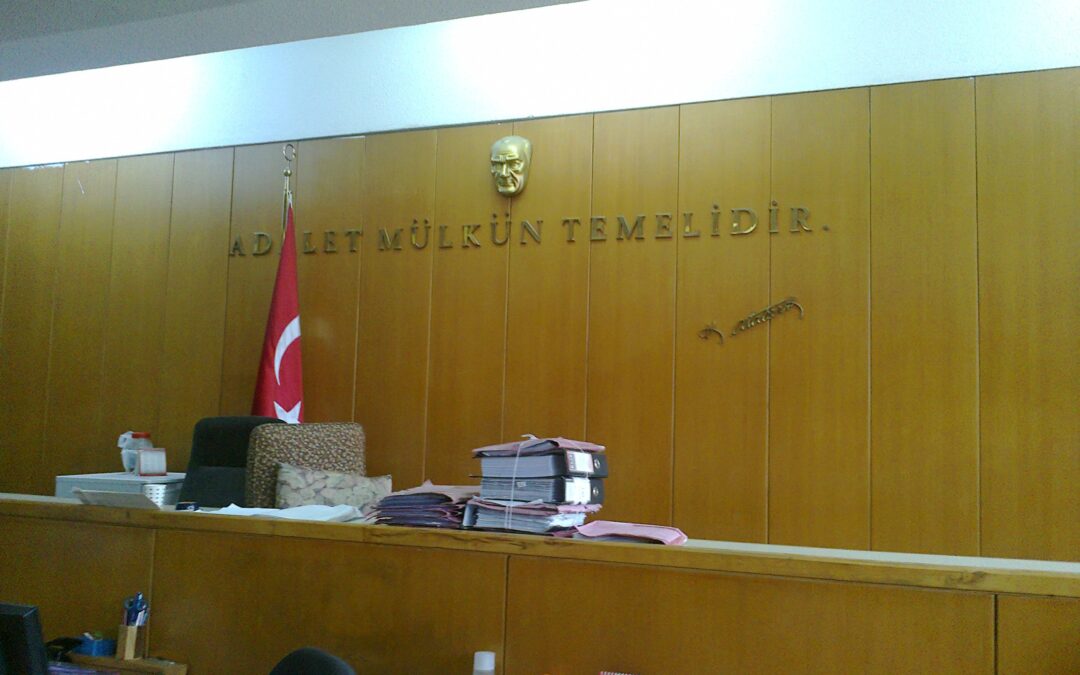
Feb 28, 2020 | News
The ICJ and the International Bar Association’s Human Rights Institute (IBAHRI) urge the Turkish Council of Judges and Prosecutors (CJP) to stop their investigation into the three judges of the Istanbul 30th Heavy Penal Court who, on 18 February 2020, acquitted the defendants in the Gezi Park trial due to a lack of evidence.
According to a statement from 30 Turkish bar associations, the sole reason for the investigation was the acquittal in the Gezi Park trial. The Council of Judges and Prosecutors, the body of self-governance of the judiciary, has the power to launch and take disciplinary action against judges, including disciplinary proceedings leading to removal from office.
“The launch of such an investigation is a further sign of the grave decline of the rule of law in Turkey”, said Massimo Frigo, Senior Legal Adviser for the ICJ Europe and Central Asia Programme “The disciplinary proceedings against these judges appear to be a direct interference in their decision-making power and will have a chilling effect on the independence of all members of the judiciary.”
“The role of the Council of Judges and Prosecutors should be to protect the independence of the judiciary – not to be an instrument of control and pressure against individual judges” said Massimo Frigo.
IBAHRI Co-Chair, the Hon Michael Kirby AC CMG, commented: “The IBAHRI and the ICJ jointly welcomed the acquittal of Osman Kavala and the other 15 defendants. Now, we condemn the re-arrest of Mr Kavala, continue to stand with the defendants, and call for Mr Kavala’s immediate release. We implore the Turkish Council of Judges and Prosecutors to reconsider the hugely damaging impact their inspection of the judges will have on the principles of judicial independence and the rights of lawyers, and to cease all action in this respect.”
The launch of this investigation occurred immediately after the acquittals in the Gezi trial, spurred by the vehement public protests by President Erdogan against the verdict.
30 Turkish Bar Associations have issued a statement calling for the resignation of the members of the Council of Judges and Prosecutors and considered this investigation as a violation of the principle of judicial independence under the Turkish Constitution.
Background
The defendants in the Gezi trial – with the exception of those not present in Turkey who will be tried separately – were acquitted on 18 February for lack of evidence. The ICJ and IBAHRI welcomed the acquittal after having observed all hearings of the trial. The very evening of the verdict, one of the defendants, Osman Kavala, was re-arrested on suspicion of “attempting to disrupt the constitutional order” connected to the failed coup attempt of 2016.
Osman Kavala has been in detention since 18 October 2017 pending trial on charges connected to the Gezi Park protests. The Gezi Park protests began in May 2013 as an effort by a group of environmentalists to save a park in central Istanbul from being rezoned, but soon grew into nationwide demonstrations. Police quelled the protest in Taksim Square with the use of tear gas and water cannons.
Contact:
Massimo Frigo, ICJ Senior Legal Adviser – e: massimo.frigo(a)icj.org – t: +41229793805
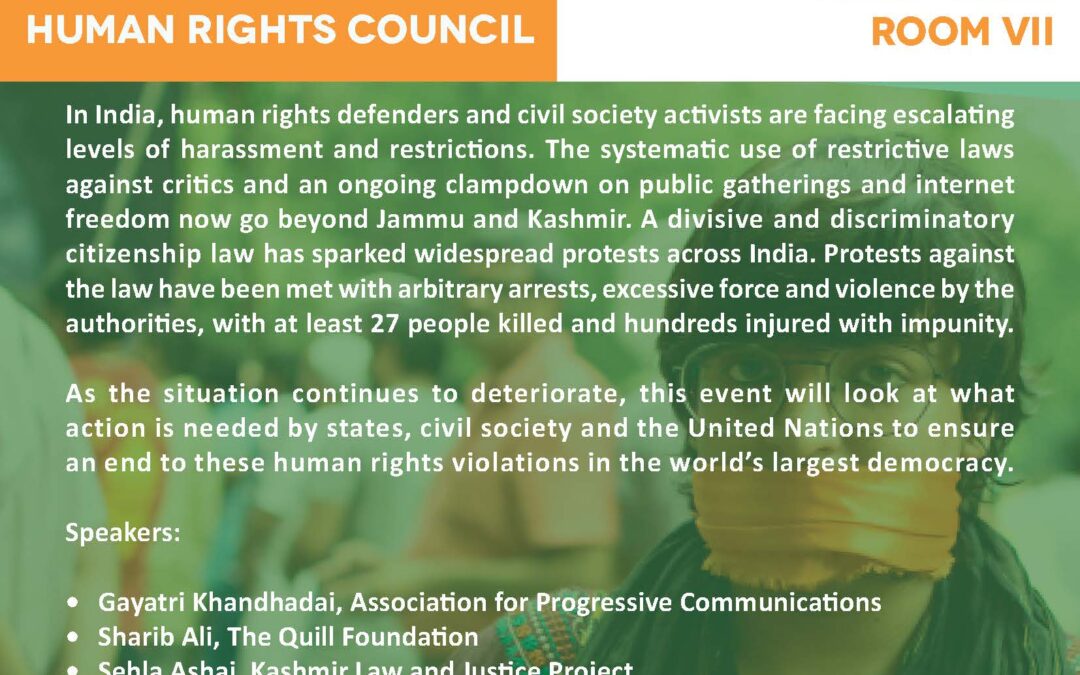
Feb 27, 2020 | Events, News
On 2 March, the ICJ and other NGOs will present discussion of the situation for human rights in India at a side event to the UN Human Rights Council in Geneva.
The event takes place Monday 2 March 2020, 14:00 – 15:00, in Room VII, Palais des Nations, Geneva.
In India, human rights defenders and civil society activists are facing escalating levels of harassment and restrictions. The systematic use of restrictive laws against critics and an ongoing clampdown on public gatherings and internet freedom now go beyond Jammu and Kashmir. A divisive and discriminatory citizenship law has sparked widespread protests across India. Protests against the law have been met with arbitrary arrests, excessive force and violence by the authorities, with at least 27 people killed and hundreds injured with impunity.
As the situation continues to deteriorate, this event will look at what action is needed by states, civil society and the United Nations to ensure an end to these human rights violations in the world’s largest democracy.
A flyer for the event can be downloaded here in PDF format: UN-Event-India-2019










